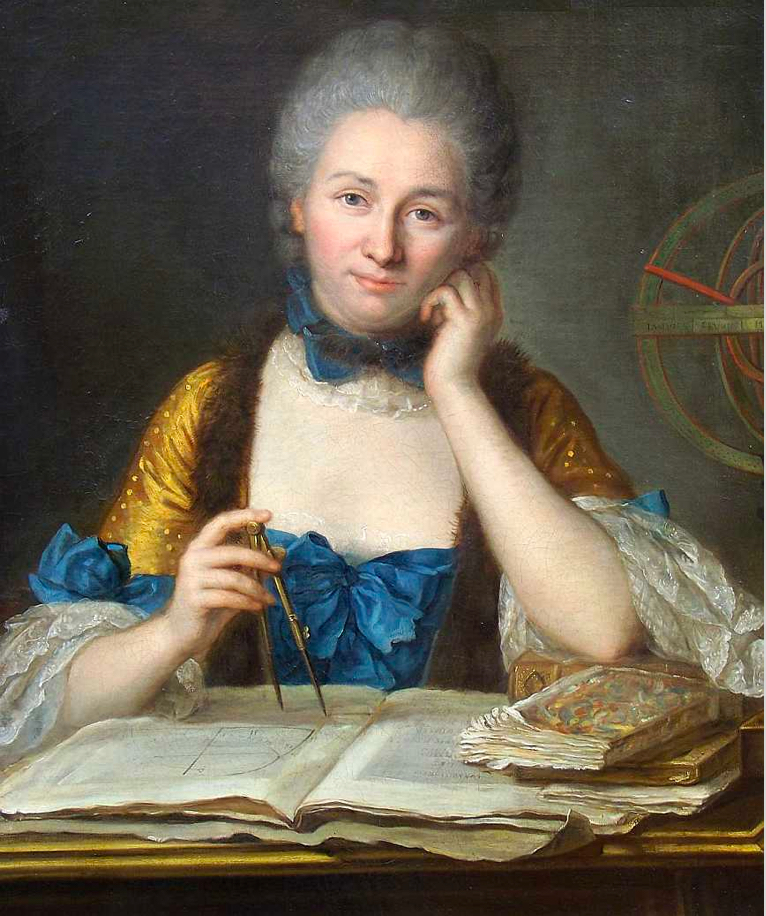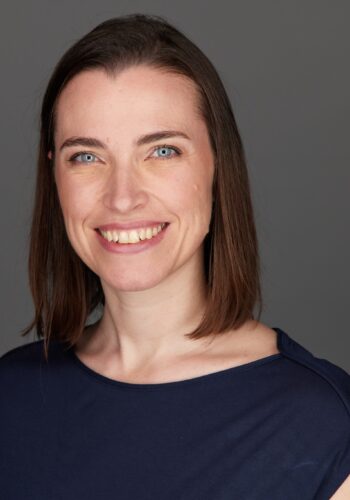POURQUOI LA TECH ?
Pour moi, technologie = possibilités + sens. C’est l’idée qu’il est possible de créer de nouveaux objets, de nouvelles choses au service des humains. La tech parle à deux facettes assez opposées de ma personnalité : un côté créatif en même temps qu’un côté très rationnel. C’est sans doute pour cela que ça a été un choix assez évident dans mon parcours.
VOTRE PARCOURS ?
Dans ma formation comme dans mon parcours professionnel j’ai souvent pris des chemins indirects. J’ai ainsi intégré une école d’ingénieur, Supélec, suite à un diplôme universitaire de technologie. Après une première expérience professionnelle dans le conseil, je suis finalement revenue aux études pour faire un doctorat en informatique. J’ai exercé en tant qu’enseignante-chercheure en informatique pendant plusieurs années, et il y a 7 ans j’ai décidé de changer à nouveau d’orientation pour devenir conseillère pédagogique (au sens formatrice de formateurs) et m’expatrier en Suisse.
VOTRE PREMIÈRE EXPÉRIENCE PROFESSIONNELLE DANS LA TECH ?
Jeune ingénieure fraîchement diplômée, j’ai intégré une entreprise de conseil en architecture logicielle. J’ai énormément appris en très peu de temps et les missions pour différents clients m’ont permis de faire un tour d’horizon d’entreprises et de métiers très variés. Et de comprendre que ce n’était pas ma voie !
VOUS FAITES QUOI AUJOURD’HUI ET POURQUOI ?
J’accompagne les enseignant.e.s de l’EPFL (Ecole Polytechnique Fédérale de Lausanne), une grande école d’ingénieurs Suisse, dans des projets d’innovation pédagogique et technologique depuis 2014. Depuis deux ans je suis plus particulièrement en charge d’un projet appelé « Notebooks Jupyter pour l’Enseignement ». Les notebooks sont des documents interactifs qui permettent de mélanger texte et code exécutable. Ils sont très utilisés en recherche et leur utilisation pour l’enseignement est prometteuse pour développer la pensée computationnelle des étudiant.e.s. L’objectif du projet est d’évaluer l’impact de ces outils sur l’apprentissage des étudiant.e.s, d’identifier les scénarios pédagogiques les plus intéressants pour ces outils et d’accompagner les enseignant.e.s dans leur utilisation. Un projet enthousiasmant à l’intersection de l’informatique, des sciences et de la pédagogie !
VOS ATOUTS POUR CE POSTE ?
C’est un poste qui demande un bon bagage en informatique pour les aspects technologiques, mais aussi une démarche scientifique pour l’évaluation des approches pédagogiques mises en place, et également la capacité d’accompagner des enseignant.e.s souvent très expérimenté.e.s – trois compétences que j’ai pu développer au travers de mes expériences professionnelles précédentes. Comme je suis ingénieure et que j’ai enseigné dans plusieurs écoles d’ingénieur, je comprends les problématiques en jeu. Enfin mon côté « geek » trouve son bonheur dans l’exploration de ces nouvelles technologies, mon côté créatif adore leur imaginer de nouveaux usages et mon côté rationnel est très rassuré de collecter des données pour vérifier que tout cela a du sens !
VOS DÉFIS PASSÉS, VOS RATÉS, VOS GRANDS MOMENTS DE SOLITUDE ?
Il y a quelques années, alors que j’essayais d’évoluer dans mon poste, j’ai dû surmonter une situation de conflit au travail. Cela a été très dur, au point où je n’arrivais plus à me lever le matin. Il était important pour moi de ne pas être dans la fuite de la situation mais de trouver une nouvelle voie qui me permette de redonner du sens à mon travail. J’ai fait appel à une coach, qui m’a aidée à retrouver confiance en moi et à construire un nouveau projet. Il m’a fallu pas loin de 2 ans pour m’en sortir, mais je sais maintenant que c’était (vraiment !) pour le mieux.
VOS MEILLEURS MOMENTS, LES SUCCÈS DONT VOUS ÊTES FIÈRE ?
Lors de mes premières années à l’EPFL, j’ai beaucoup travaillé sur l’appui aux étudiant.e.s et développé des ressources pour les aider à « apprendre à apprendre ». Avec mon collègue Roland Tormey, nous en avons fait un livre appelé « Apprendre à Etudier – Guide à l’usage des étudiants en sciences et en ingénierie ». J’étais vraiment heureuse de pouvoir mettre ces ressources à disposition du plus grand nombre, et c’était mon premier livre. Honnêtement je ne m’attendais pas à ce qu’il ait un énorme succès – on ne parle clairement pas d’un best-seller – mais il nous a quand même valu un passage au journal télévisé de la RTS (la télévision Suisse). Notre atelier « Apprendre à Etudier », proposé aux étudiants qui intègrent l’EPFL à leur arrivée sur le campus, a compté plus de 700 participants chaque année : c’est le plus grand groupe d’étudiant.e.s auquel j’ai jamais enseigné ! Par la suite nous avons publié un MOOC ainsi qu’une application d’aide à l’apprentissage appelée le « Learning Companion ». J’ai trouvé passionnant de baser la conception de ces ressources sur les connaissances scientifiques existantes sur l’enseignement et l’apprentissage – un vrai travail de scientifique et d’ingénieur !
DES PERSONNES QUI VOUS ONT AIDÉE/MARQUÉE OU AU CONTRAIRE RENDU LA VIE DIFFICILE ?
Certains des profs que j’ai croisés dans mes études ont cru suffisamment en moi pour me pousser à aller plus loin, je pense notamment aux profs de DUT qui m’ont encouragée à poursuivre en école d’ingénieur et aux profs d’école d’ingénieur qui m’ont offert de rejoindre leur équipe de recherche pour faire mon doctorat. D’autres sont pour beaucoup dans mon goût pour l’enseignement et m’ont inspirée pour concevoir mes cours par la suite. J’ai aussi eu la chance de rencontrer des collègues extraordinaires dans toutes les équipes dont j’ai fait partie. J’ai adoré travailler avec eux et j’ai énormément appris à leur contact, beaucoup sont devenus des ami.e.s – elles et ils se reconnaitront. Enfin, ça parait presque banal de le dire mais c’est tellement vrai : ma famille et mes amis ont toujours été là pour moi et m’ont beaucoup soutenue dans les passages difficiles.
VOS ENVIES ET DÉFIS À VENIR ?
Je viens d’accepter un nouveau poste à l’EPFL, pour travailler au Centre pour l’Education à l’Ere Digitale. Dans la continuité du projet dont je parlais précédemment d’introduction de la pensée computationnelle dans le cursus ingénieur de l’école, il s’agit de réfléchir à la formation des étudiant.e.s à l’éthique, en particulier en lien avec les systèmes d’information. C’est un challenge parce que l’éthique est un sujet complexe, fondamental pour exercer en tant qu’ingénieur.e et pourtant très peu abordé dans leur formation. De beaux défis en perspective !
ET VOUS FAITES QUOI EN DEHORS DE VOTRE TRAVAIL ?
J’ai un petit garçon de bientôt 8 mois donc les journées, les soirées et les nuits sont bien remplies actuellement ! Par ailleurs la situation sanitaire rend le fait de voir les amis très difficile en ce moment, donc les sorties se font rares et j’avoue que cela me pèse beaucoup. Je fais partie d’une association internationale de Tai-Chi Taoiste et nous n’avons pas pu pratiquer ensemble depuis plus d’un an, sauf quelques fois en extérieur l’été dernier… Heureusement nous avons la chance de pouvoir profiter du lac Léman ou des montagnes toutes proches pour randonner ou simplement prendre l’air. En dehors de cela, j’aime énormément lire (des romans, principalement) et je me défoule au son de la zumba.
VOS HÉROÏNES (HÉROS) DE FICTION, OU DANS L’HISTOIRE ?
L’un de mes héros préférés s’appelle Po, c’est le panda de « Kung-Fu Panda » (oui, je dois avouer un petit faible pour les dessins-animés – mon côté grand enfant peut-être…). Alors que tout le monde se moque de lui et de son rêve de faire du kung-fu, Po devient l’un des maîtres du genre le jour où il comprend que « il n’y a pas d’ingrédient secret ». De l’importance de croire en soi pour réaliser ses rêves !
VOTRE DEVISE FAVORITE ?
« A l’impossible nul n’est tenu » : je dois me la répéter assez souvent car j’ai tendance à vouloir toujours tout faire jusqu’au bout quelles que soient les conditions, parfois jusqu’à l’épuisement…
UN LIVRE À EMPORTER SUR UNE ÎLE DÉSERTE ?
Si on parle ici de survivre lorsque l’on est seul au monde, alors pour moi LE livre adapté à la situation est « The Martian » d’Andy Weir. C’est un petit concentré d’ingénierie et de science (et de fiction aussi, bien sûr) que je ne me lasse pas de lire et relire tellement il est réaliste et passionnant.
UN MESSAGE OU UN CONSEIL AUX JEUNES FEMMES ?
Croyez en vous ! Même si je sais qu’au quotidien c’est loin d’être évident. Et puis surtout n’hésitez pas à vous faire aider pour dépasser les moments difficiles.


